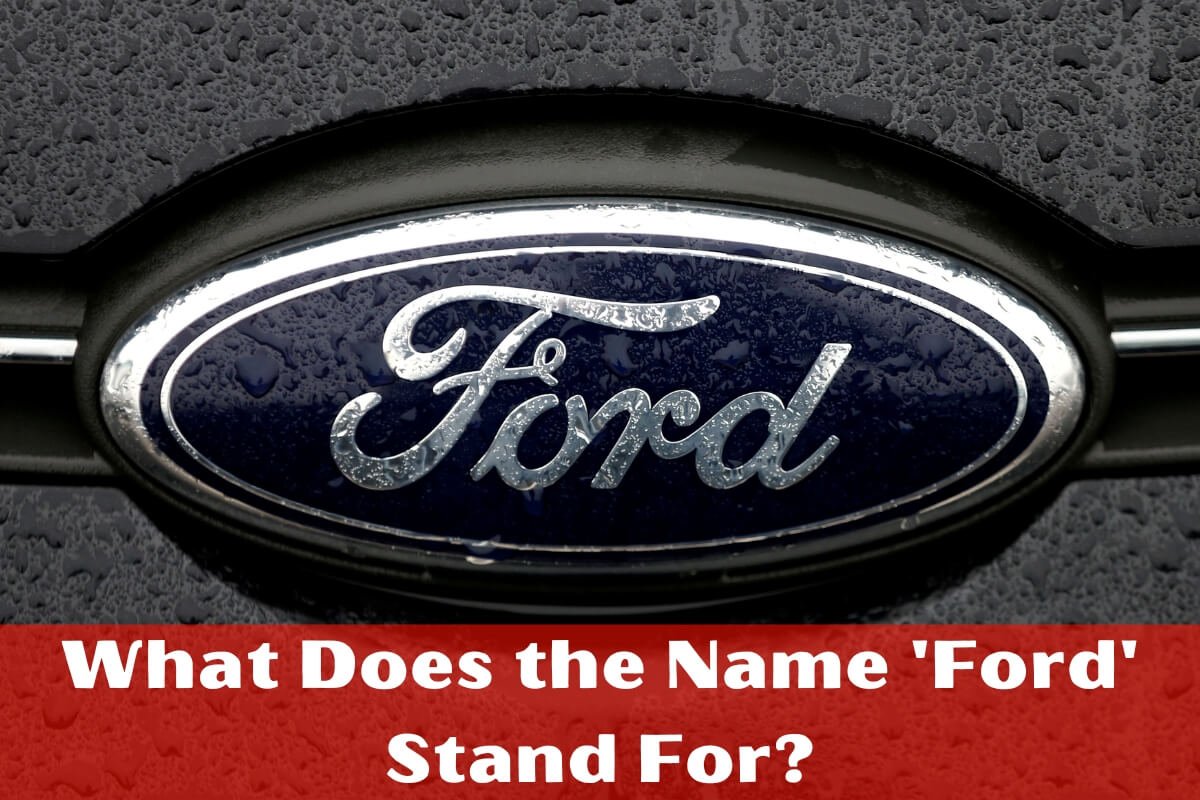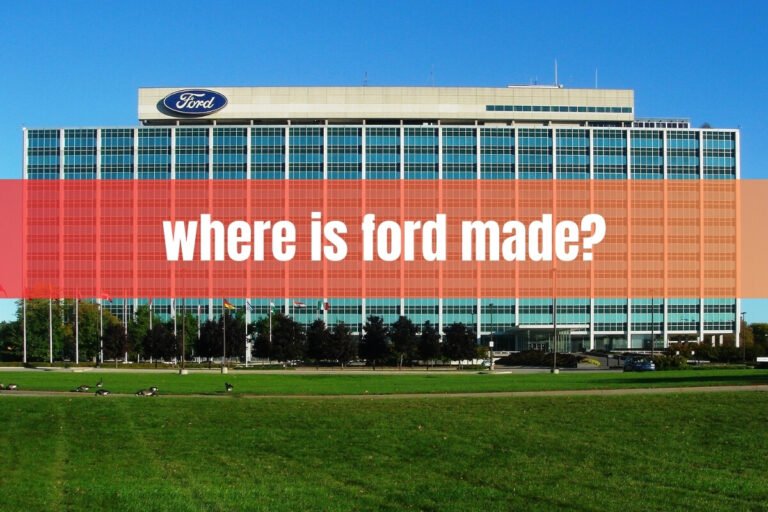What Does the Name ‘Ford’ Stand For?

The Ford name is synonymous with American automotive excellence. From the legendary Model T to modern tough trucks and performance cars, Ford has maintained a reputation for reliability, capability and innovation for over a century. But what does the name “Ford” actually mean or represent?
The simple answer is that Ford is not an acronym – it’s named directly after Henry Ford, the company’s founder. However, the Ford name has taken on much deeper significance and come to embody the brand’s core values over time.
In this in-depth article, we’ll explore the origin of the Ford name, what it has come to represent for the iconic American automaker, some of the disparaging “backronyms” used by critics, the history behind major Ford vehicle names and logos, and fun facts about the company’s lasting legacy.
Henry Ford founded the Ford Motor Company in Detroit in 1903, though it took another five years until the inception of the Model T in 1908 for the company to find its foothold. The Model T was Ford’s first hugely successful automobile, making car ownership attainable for the masses with its simple, affordable design.
From these humble beginnings, Ford became one of the biggest and most influential automakers in the world. The company’s name has been intrinsically tied to this remarkable history and the man who started it all – Henry Ford.
The Origin of the Ford Name
There’s no deeper meaning or acronym that the name “Ford” stands for – it quite literally comes from the surname of the company’s founder, Henry Ford. Born in 1863 on a farm in Michigan, Ford showed an innate mechanical ability and passion for tinkering from a young age.
After various mechanical jobs and an apprenticeship as a machinist, Ford had a voracious desire to build a simple, reliable and affordable car for the masses. In 1903, he started the Ford Motor Company with $28,000 from twelve investors.
Five years later in 1908, the Ford Model T was born – a true game-changer that made horseless carriages accessible to the middle class with a price around $825 (around $25,000 today). With its 20 horsepower engine and top speed of 45 mph, the Model T ushered in a new era of transportation and manufacturing.
As the extraordinarily successful Model T put the Ford name on the map, it cemented the legacy and vision of its founder Henry Ford. From this modest beginning, an American automotive dynasty emerged that carries his name over 100 years later.
What Ford Stands For As a Brand
While the name Ford itself isn’t an official acronym, it has come to represent and embody several key brand values and qualities that define the company:
Reliability – Ford’s very first cars like the Model T were designed to be simple, durable and reliable modes of transportation. Dependability remains a core part of Ford’s brand identity to this day, especially for its line of tough, hard-working trucks.
Performance – From the iconic Ford Mustang to racing programs like NASCAR, Ford has a heritage of high-performance vehicles designed to excite drivers. Innovation in power and speed continues to be a brand focus.
Innovation – Henry Ford revolutionized manufacturing with the moving assembly line and a focus on affordability. This spirit of creative thinking and pioneering new technologies carries on, like with Ford’s leadership in electric vehicles.
American Automotive Leadership – As one of the “Big Three” U.S. automakers alongside GM and Chrysler, Ford has represented American ingenuity, industrial strength and a brand built for hard work and perseverance for over a century.
So while not technically an acronym, the Ford name and blue oval badge have become symbolic of the company’s enduring dedication to cutting-edge vehicle design, working-class performance and reliability, and a uniquely American drive for innovation.
Disparaging Meanings of “FORD” Used By Critics
Of course, no automotive brand survives over 100 years without earning a few detractors and critics along the way. In the case of Ford, there are a number of disparaging backronyms and altered meanings that get thrown around in car communities, forums and among rival fan bases.
Some of the most common negative interpretations of what the “FORD” name represents include:
Fix Or Repair Daily – This acronym jokes that Ford vehicles are unreliable and frequently need fixing or repairing.
Found On Road Dead – Taking it a step further, this implies Ford cars literally break down and get abandoned on the side of the road.
Fucker Only Runs Downhill – A more vulgar acronym used by critics to say Fords can only go downhill, not uphill.
Rivalries between the big three American automakers inspire many of these acronym insults too. Some examples:
Flipped Over and Rebuilt Dodge – Used by Dodge fans to imply Fords are just re-badged, inferior versions of their brand.
Found On Redneck’s Driveway – Aimed at Ford’s reputation as a favored brand among rural drivers and truck enthusiasts.
While disparaging, most of these backronyms are all in good fun and come with the territory when you’re an automotive brand with such immense popularity and history. And of course, Ford fans are quick to fight back with their own positive alternates like:
First On Race Day Ford Owners’ Really Decent Fine Outstanding Rugged Design
At the end of the day, the actual meaning of “Ford” remains simply the name of its visionary founder Henry Ford – not an acronym for anything scandalous or negative.
The First Ford Vehicles and Logos
Before we explore some of the major Ford vehicle names and their origins, it’s helpful to understand a bit more about Ford’s earliest car models and how the iconic blue oval logo came to be.
The original 1903 Ford logo featured a simple, minimalist design of the company name written in an elegant cursive font surrounded by an oval. This oval shape was meant to represent the strength, durability and reliability of Ford’s products.
Of course, it was the immensely popular Ford Model T five years later that truly launched the company into households across America. The Model T established Ford’s reputation for no-frills, affordable transportation built to withstand rugged conditions.
As the decades went by and models like the Ford Model A and the iconic “deuce coupe” hot rods entered the scene, the Ford logo saw several redesigns and updates. However, the core oval shape representing durability remained.
It wasn’t until 1927 that the logo incorporated the now-iconic blue oval with the Ford name in distinctive tall letters across the center. This crisp, bold design has endured as one of the most recognizable logos worldwide and come to represent Ford’s American automotive leadership on the global stage.
Major Ford Vehicle Namings and Their Origins
Beyond the company and brand name itself, Ford has introduced dozens of individual vehicle names and model lines over the decades, many of which have their own unique etymologies and naming origins. Let’s explore the background behind some of the most famous:
Ford Mustang – The Mustang name was inspired by the wild horse of the same name, synonymous with freedom, power and an unbridled spirit. Other names considered included Cougar, Cheetah and Torino before Ford employee Steve Reekie suggested Mustang.
Ford F-Series Trucks – The best-selling truck line in America simply takes its name from “Ford” and the “F” designation, signifying “Truck” in the company’s internal model code language at the time.
Ford Explorer – One of the first mainstream SUVs, the Explorer name evokes a spirit of adventure and discovery. Ford drew inspiration from explorer ships and vessels like the Endeavor.
Ford Escape – While a curious name for a rugged SUV, “Escape” aimed to convey a sense of breaking away from the ordinary for adventures off the beaten path.
Ford Expedition – Yet another SUV leaning into themes of journey, travel and exploration. The Expedition is the biggest and most capable in Ford’s truck-based lineup.
Many other Ford models tie into similar themes of power, performance, toughness and exploration – names like Bronco, Ranger, Maverick and Raptor instantly convey a sense of rugged capability.
While Ford has long moved away from its earliest alphanumeric model names like the Model T and Model A, these more modern monikers have become icons in their own right. And they’re all part of the living legacy that adds dimension to the simple, yet extremely meaningful “Ford” name.
Ford’s Company History and Legacy
There’s certainly no denying Henry Ford’s seismic impact on the automotive industry and American manufacturing as a whole. His pioneering work with the moving assembly line and pursuit of building simple, affordable cars for the masses revolutionized how vehicles were produced.
Beyond just the name itself, Ford Motor Company has represented American industrial might, ingenuity and a blue-collar work ethic for well over a century now. As one of the “Big Three” U.S. automakers alongside GM and Chrysler, Ford weathered world wars, economic depressions, oil crises and constantly evolving consumer demands.
Key milestones and achievements in Ford’s long, celebrated history include:
- The iconic Ford River Rouge Complex opening in 1928 as the largest integrated factory in the world at the time
- Over 15 million of the game-changing Model T’s produced from 1908-1927
- Leading the “Arsenal of Democracy” by producing vehicles, tanks and bombers for Allied forces during WWII
- Introducing the first affordable muscle car, the Mustang, in 1964
- Cementing its legacy with trucks by launching the best-selling F-Series in 1948
While Ford has seen its share of ups and downs like any company, it remains an industrial powerhouse and respected name over 100 years later. Much of that is owed to Henry Ford’s original vision, integrity and never-ending quest for innovation.
Ford’s Brand Values and Reputation Today
In the modern era, Ford has worked hard to uphold its brand reputation for building tough, reliable trucks and vehicles for work and adventure. The F-Series has reigned as America’s best-selling truck for over 40 consecutive years by continually innovating while staying true to its rugged roots.
At the same time, Ford has embraced the need to stay on the cutting edge with electric and hybrid offerings like the Mustang Mach-E, Maverick hybrid truck, and the electric F-150 Lightning. The spirit of innovation that Henry Ford pioneered lives on over a century later.
While critics will always poke fun with disparaging backronyms, in the eyes of most consumers Ford continues to represent dependable, high-performance, no-frills American automotive excellence. The brand’s classic blue oval and well-known models like the Mustang, F-150 and Explorer are instantly recognizable worldwide.
Fun Ford Facts and Trivia
To wrap up our exploration of what the name “Ford” represents, here are some fun, little-known facts and trivia about the company:
- The first Ford model not named after a letter was the 1957 Ford Thunderbird
- Lee Iacocca helped create one of Ford’s biggest hits – the Ford Mustang
- Ford produced over 4.7 million Mustangs by its 50th anniversary in 2014
- In 1964, Ford had the ingenious idea to create a Limited Edition Ford Mustang Convertible just for the promotion of the World’s Fair
- The best-selling Ford car line of all time? That would be the compact Ford Escort, selling over 20 million units globally.
- Jesse James’ 1967 Ford Mustang GT500 “Deathmustang” clone recently sold at auction for $350,000
- Speaking of celebrities, Henry Ford once hosted Thomas Edison, John Burroughs, and President Theodore Roosevelt for a camping adventure in Maryland
- Ford held the land speed record for over two decades from 1965-1986 with its Ford GT40 supercar
Clearly, while simple on the surface, the name “Ford” carries immense significance, both as a nod to the company’s visionary founder and to represent over 100 years of American automotive pride, performance and innovation.
In Summary
To sum it all up, the meaning behind the Ford name is quite straightforward – it’s simply the surname of founder Henry Ford, the man who revolutionized automotive manufacturing and mobility itself in the early 20th century. However, that simple four-letter word has taken on so much more meaning and brand equity in the over 100 years since Ford Motor Company’s founding.
Today, the Ford name evokes core brand values of reliability, toughness, performance, innovation and quintessential American industrial might. From the original Model T to the modern F-Series and Mustang, Ford has stayed true to Henry’s original vision while fearlessly evolving and leading the way in new automotive technologies.
So while critics will always find a way to spin “FORD” into a silly, disparaging backronym, in the eyes of millions of hard-working Americans and automotive enthusiasts worldwide, it simply stands for the enduring pursuit of simple, capable and reliable transportation – just as Henry Ford envisioned over a century ago.






